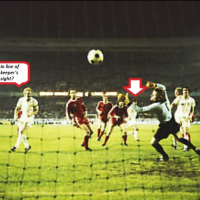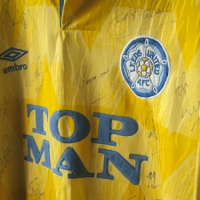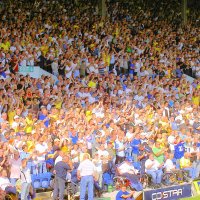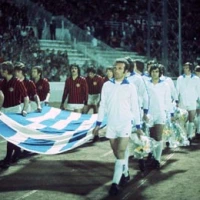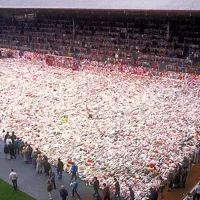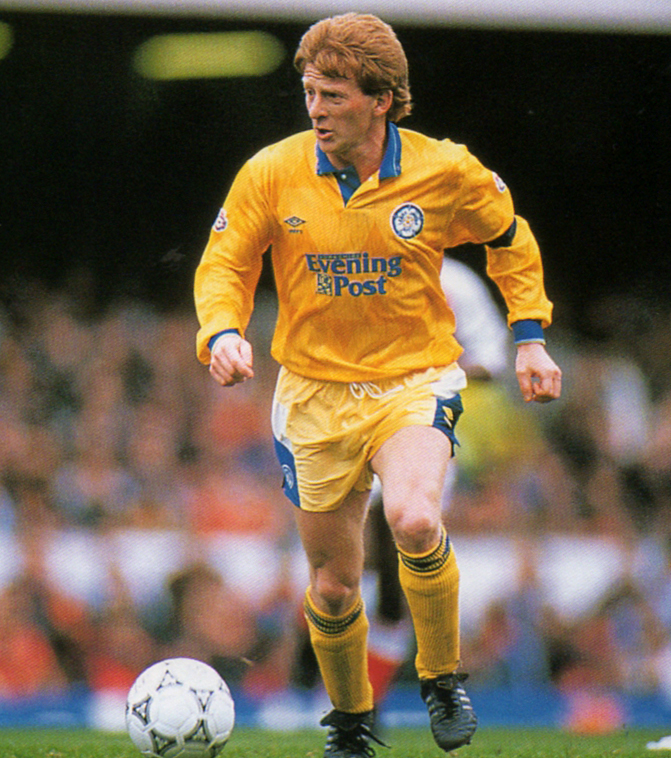The Tyrant is Gone
It’s difficult not to sympathise with the current plight of Man U. Well, apparently it is for BSkyB, anyway. Others seem to manage OK. Gary Lineker, introducing Match of the Day, promised action featuring “all of the top four”. Then, smiling at the camera really quite maliciously, he added “And Man U as well.” There appears to be an insidious tendency to poke fun at the wounded Champions, and it begs the question why. As someone myself who never feels quite so alive, never quite so full of the sheer joy of living as when Man U are having their noses well and truly rubbed in it, I have an answer to offer. The fear has gone. It went with Ferguson, and people now feel happy to laugh at Man U. All very petty, you might think – but this absence of fear might have far-reaching consequences for The Pride of Devon.
Steve Clarke, West Brom’s talented young(ish) manager, made for an interesting listen in post match interviews after his team’s 2-1 victory at the Theatre of Hollow Myths. Firstly, he demanded credit for his team’s marvellous display, based on self-belief and a determination to show little respect for reputations, rather than lazily blaming the under-par display of Man U. He went on to say that he had spent four days talking to his team about the mind-set required to play away against Man U; advice on not sitting back, seizing the day, going for the throats of the opposition, showing no fear. And West Brom responded to their manager’s mantra, tearing into a startled Man U from the off. Unlikely as it seems, and despite a late home flurry, this could have been one humbling home defeat for Man U. The last time they lost at home in the league to West Brom it was a 3-5 reverse in 1978. On this occasion, a 5-2 or 6-2 victory would not have flattered the away side.
The thing is, that advice may well have been given to teams visiting Salford before, but it has rarely produced such positive gains for those teams down the years. I remember well the performance of third-tier Leeds United in the den of the Champions in January 2010 for the FA Cup 3rd Round. My favourites took the field as if they owned it, backed by 9000 raucous away fans and proceeded to out-play, out-fight and out-manoeuvre a team stratospherically above their humble level, winning 1-0 and rather unlucky it wasn’t 3-0. Leeds showed self-belief, faith in their own ability to dictate play and absolutely no fear or respect whatsoever. It was the kind of display seen far too seldom by teams facing Man U, who tended over many seasons to be beaten before their boots had touched the turf at the start of the game. And it’s this ingrained fear, this subconscious feeling of being beaten before a ball is kicked that has exaggerated the achievements of a club who, until Ferguson embarked upon his reign of terror, could only dream of Title success.
Football success, they say – or even football dominance – is cyclical. Nobody stays at the top forever, the best of dynasties crumble and fall eventually. This will not be a welcome concept for the bulk of the Man U support, who have long journeys from the south to justify somehow, who have only attached themselves to the embodiment of success and who will protest loudly if the run of glory ends. But they can always seek their glory elsewhere – many of them will. It’s in the nature of the beast. Man U fans tend to be slightly inadequate and in Freudian need of the reassurance that identification with perceived size and success provides for them. So off they’ll go and support Chelsea or Spurs or someone – the travel costs will be greatly reduced, anyway. But what of those left behind? What of the legions of armchair fans? What of poor David Moyes, looking more and more like a latter-day Wilf McGuinness? What, even, of the legions in the Far East who will find the whole reason for their devotion to Man U has dissipated – if they stop winning.
Then we have to look at the consequences for merchandising, the awful possibility that there might be a Champions League qualification failure, the chilling realisation that there is still all that debt. The debt would have been even higher if Moyes hadn’t been so singularly ineffective in the transfer window. The potential for things to get worse for Man U seems endless – and endlessly amusing.
None of this seemed remotely likely whilst Ferguson’s brooding presence was there, haunting the nightmares of referees and officials, causing ulcers in the FA Boardroom as they invented ever more specious reasons for failing to file disrepute charges, terrifying the hacks of the gutter and quality press alike with threats of cutting them off from the media circus that is Man U. All Ferguson wanted was his own way, all the time and he set about getting it via the longest continual process of widespread intimidation the game has known. Aided by the favourable market conditions provided when Murdoch bought the game, Man U flourished by this tyrannical dynasty – and the results are there in the trophy room where thirteen plastic replicas of Thunderbird One attest to a total domination of the Plastic Premier League. Only Castro in modern times has out-done Ferguson as a successful tyrant and dictator.
But now Ferguson has gone – at least for the time being. He may yet, of course, reappear on a Busby-like comeback rescue mission if Moyes is sacked as a failure – shades of the early seventies. For now though, the tyrant is rendered impotent to assist Man U as they flounder and the whole atmosphere of the top flight has changed. Referees feel empowered to be fair instead of giving every bloody 50-50 decision to Man U. Opposition managers feel their charges freed from that psychological monkey on the back. Press hacks – despite Moyes’ pallid efforts to ape the Ferguson abrasive approach – are not fooled; they know that a crabby old lion has been succeeded by a querulous pup.
All of these factors have conspired to reduce the advantages enjoyed by Man U these many years since Ferguson headed south. It’s always been a game of fine margins, and any reduction in advantage tends to have a disproportionate effect on performance. This is what is happening to Man U – and it’s like a breath of fresh air. Not everyone will be happy, not everyone will want to see the dominant force of the past two decades rendered impotent. But for many – if only it can last – this new Fergie-less era could be the very best of times, after the very worst.


